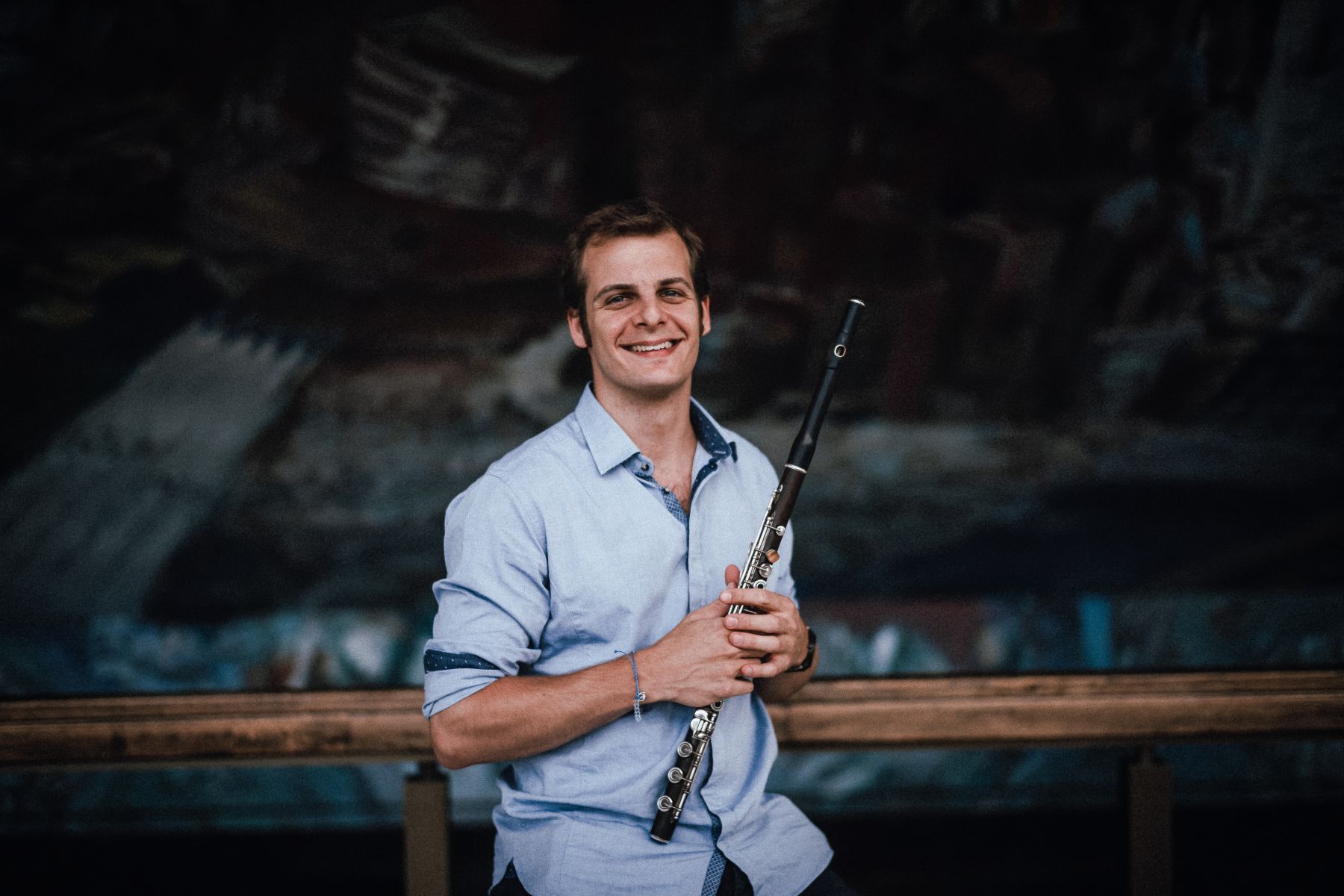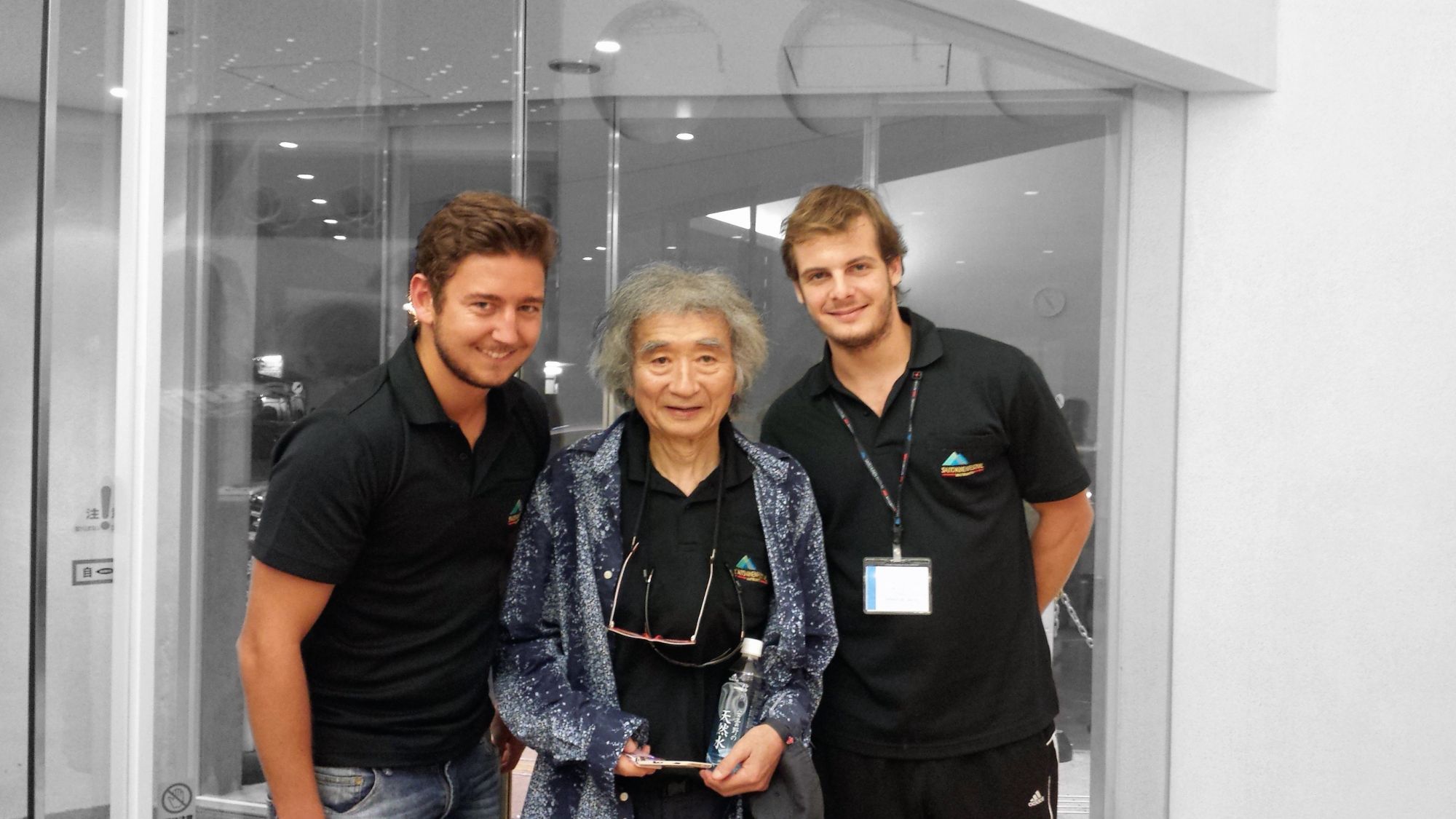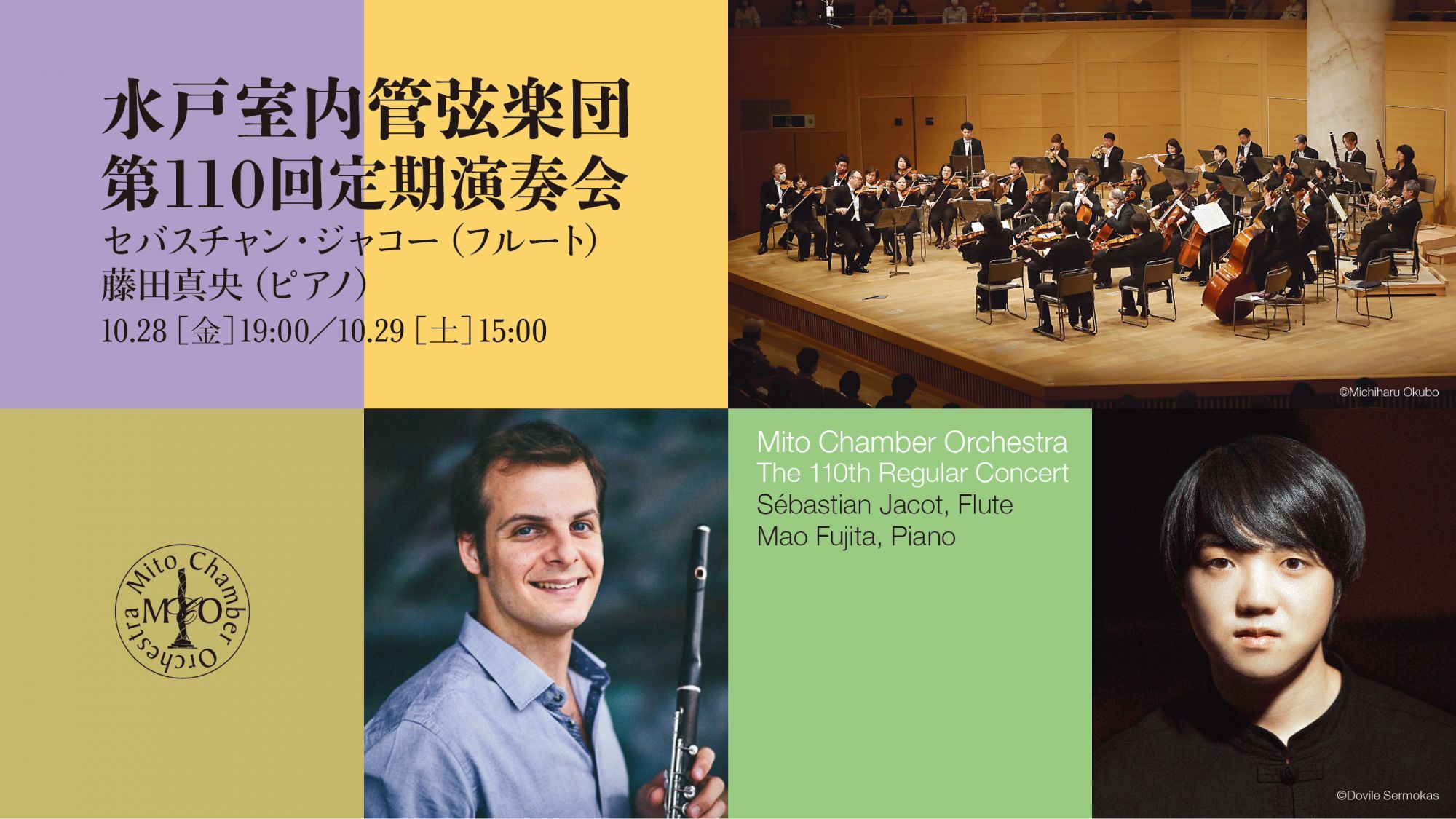- Concert
- ORCHESTRA
- Performance
2022-09-18 Update
Mito Chamber Orchestra【Artist Interview】Sébastian Jacot (Flute)

We are so happy to welcome you as a soloist and a new regular member of the Mito Chamber Orchestra(MCO) in October. Also congratulation for getting the principal position of the Berliner philharmoker.
Yes, I haven't started yet, I haven’t done this. I can't wait to start with them. I have played only a few times with them now, but it's a nice feeling. I will start directly after the concerts in Mito, then fly to Berlin, and the next day, I will start working there.
That must be exciting start of the new season!
Yes, but the whole season has been like this for me. In March, I won the San Francisco Symphony Orchestra’s principal position. I asked them to wait until the audition in Berlin. They waited for me very nicely. But after getting the position in Berlin, I decided to go to Berlin. I asked the Berliner philharmoniker to wait until I would finish the concerts of the MCO. Also I got married this summer, two weeks ago.
I’m really happy for you! Let me ask you about your background. Why did you choose your instrument when you were a kid?
OK. I have five brothers and sisters, they are all younger than me. But they're all musicians as well. I know, when my brother was three, he wanted to play the violin. My sister wanted to play the harp, but she was a bit too small, so we gave her a cello. For me, I felt like trying something not too difficult and I just started the recorder. I always wanted to play something with air, because when I was a baby, I had breathing problems. I stopped breathing many times and my mom had to save me, reanimate. So I thought the breathing thing was important for me. The recorder was super nice because I remember having a very good teacher. We played all the Baroque music on the recorder and I felt something very close and natural. But I began to feel very limited with the recorder, and someone next door was playing the traverse flute. So I started wanting to play the travelse flute. I began the traverse flute when I was eight.
Were your parents also musicians?
My mother plays piano and teaches music in general, and she's a school teacher as well. My dad did a bit of guitar when he was younger but he was never really participating in the musical life. But he was happy listening to us. My mom has made for all of us brothers and sisters. We made a small orchestra together and she arranged about 300 pieces for all of us. We still play together sometimes because we have two violins, trumpet, harp and cello. Saxophone is another thing. After two years of playing flute, I also started to play saxophone. I have a certificate in saxophone as well. We have different pieces together, I can show you once!
You entered the Conservatory in Genève when you were 15 years old. Did you have any teachers who inspired you a lot when you were young?
I had quite a few teachers at the beginning. My first teacher taught me how to play flute and music, and explained all the rules that I did not understand in my head at that time. Also, he wrote all the concepts on every single note. If you have an accent, he wrote the length and every bit of the accent: long, short, etc. When we see the decrescend, he wrote like “quite a little bit here, the accent a bit open, a bit more close…”. I did not notice it at that time, but he really did. He passed away some years ago and I’ve been taking all the scores he gave me. I realize that he actually wrote every phrasing: the breath was smaller, bigger, and all the details. We played all the basic repertoires of Baroque music for flute: Bach, Purcell, Händel, Carl Philipp, and Telemann. He really taught me not only the technique of the flute but also how to phrase and breathe. This was my four years of solid learning. Then I met Isabel Giraud when I was 12 and that's when I decided to play the flute seriously (professionally). I was still doing a lot of sports, but I really liked the flute and I felt that I was not too bad with it. If I wanted to do it, I had to start studying properly, not just playing for fun. She said “I will teach everything, and you have to change your technique completely. Your embouchure is wrong and you cannot play like this nowadays”. So we started everything from zero and she gave me everything she had. After two years, she said “I have nothing more to teach you. You have to go to the next teacher. Go audition for the class of Jacques Zoon”. That's when I was 15.
What kind of advice did you get from Mr.Jacque Zoon?
When I met him, I was very young so he was like a father. And he was also very new to Genève. He was there only for 2 years so he didn't speak perfect French at that time. But somehow we never had to speak much. He could just show me and I understood without words, it was very. good relationship we had and still we have. He had a lot of students in his life and they are completely different. He really brings out the best inside of each student. He doesn't put his idea onto you, instead he gets your idea out and tries to give you the tools to express yourself. That’s what I learn most from him. For some people, it may be difficult because they don't know what they want to say. For me it was really good because I had something to say, but I didn't always know how to do it, but he gives you the tools. He wants you personality, your love, your music, your ideas. He's very, very open minded and this is something I like a lot about him.
You've played with Maestro Seiji Ozawa since you were 19 years old. Do you have any special experience or memories about him?
I have a lot of memories with Seiji. When I first came to Saito Kinen Festival, he invited me for the Cunning Little Vixen, the Czech Opera. It was my first time to play real Opera. When I was in the Hong Kong Philharmonic Orchestra, I played the symphonies and a couple of ballets. The funny thing is my mother is Czech like Janáček. So I knew the Czech language a little bit. I was so impressed that he could sing the whole text of opera in Czech. In the rehearsal, he was giving the queues to all singers and he could sing every line with them. I was like “Oh my God, this is something special”. I was almost shocked because he could conduct the music so well and organize everything so musical, and also took the time to learn the whole text of opera written in foreign language. The thing is, he was doing the rehearsals in Japanese, he never spoke in English at the time. I didn't understand Japanese when I was 19. Now I know how to read and write the katakana so that I can at least order the food in the restaurant. At that time, however, I could not understand anything of the Japanese language. But when he spoke in Japanese, somehow it made sense. He has the natural power to express with his overwhelming personality, so pure, simple, and clear and you just understand. I loved it from the beginning. That kind of personality is a bit like Jacque. I connected with him very quickly. I really miss playing with him. When I come to Mito and Matsumoto, we all have his memories. We know what he would want, how he would say a thing and do it. We play with him in our hearts. This is what makes an orchestra of Mito and Saito Kinen so special.

From right: Sébastian Jacot, Maestro Seiji Ozawa and Philippe Tondre
You have played with the MCO two times. Do you have any impression of the MCO?
I love Mito as a city and I love to play in Japan in general. I come to play in the Saito Kinen Orchestra since 2008. I did some solo concerts in Nagoya with the Kansai Philharmonic Orchestra, and also in Tokyo and Kobe. For me, the Japanese orchestra is really nice to play and the Mito Chamber Orchestra is the best of Japan! My favorite people, the most fantastic players.. it's such an exciting week when I come to Mito. There’s just fantastic energy. You don't find a place like this anywhere else: people who want to make music, collaborate and play together, it's something very special.
You are going to play the Mozart’s Flute Concerto No.1 with us, and I guess you've already played this piece many times. Is there any aspect that still fascinates you?
We don't have so many concertos for the flute. We have these two Mozart concertos, and if you count Andante and Rondo, we can play with orchestra. And the Flute and Harp concerto in C major. We also have Ibert, Nielsen, Jolivet, and a bit of Carl-Philipp. Thus, we don't have many interesting cultures with the orchestra. Mozart’s concerto is the one we usually play for addition, so we tend to hate it because you have to play it in a way to please people. But actually, now I realized that this concerto is one of my favorite concertos because it's so pure and magical. There is so much beauty and so many refined characters. It speaks to everyone. It’s the magic of Mozart and this is something unexplainable. Now, I've been teaching this piece rather than playing it. Especially, for the last three years, there were less concerts. But I discovered so many things I want to say with this music: many aspects of creating characters. I cannot wait to play it again to share it with the audience.
I love to tell stories. Mozart was a human being like you like me. He didn't write music because it was a job or because he had to learn some theories. He had so many things inside him, so many lives, and he just wanted to translate it into music. That's a gift for us. I really like to see the different aspects of his life in the music, I mean how he built it. It's done so smartly that anybody can understand that. This is what I’d like to share with everyone: life inside his music.
What do you think is your source of inspiration for music making?
It's very simple. Like I said about Mozart, it’s life. Music is only a language. I speak French, German, English and Italian. Music is another one of these languages. If you don’t live your life in the present moment, it's difficult to make good music. I like to write and create stories on top of the music I play to relate to something. Because the composers are all humans. They're expressing their own view of life, their own experience of life in the music. I cannot imagine what it was like to live in the time of Mozart, Bath or even Wagner and Mahler. You cannot know how it was. But you can read about it and put yourself in their shoes. There was no Internet, no heating, no air conditioning, no Wi-Fi, no Bluetooth, no jet, nor ANA that takes you from Europe to Asia. Everything was rawer and closer to nature. There was much more pain in the world. One kid out of two in this time died very young. You had a lot of illnesses and if you wanted something, you really had to work for it. Nothing was easy. I always try to think of this side when they blame the music. But at the same time, now we're in 2022, not in 1700s. So you have to find something to speak to them so they can understand their emotions and sensations. If you're happy, what does it mean? Major chords and phrases are happy and the minor one is sad? This is a nice idea for babies and that's the first sensation we have. But why are you sad? Are you sad because you're missing happy memories? Or because it's not your birthday yet and you just cannot wait? Heart-broken? Did you just lose your favorite coin? Did you lose the competition? The sadness can be 1000 things. It can be so many things. It depends on you. But if your story is clear, it's gonna be easy for the audience to understand something. That's why I tell my students, when they don't know how to play something, I tell them to pack the flute and just go for a walk. You have nothing to say. They're not gonna find something to say inside of the flute. Empty. So you have to live your life. You have to observe and have detailed ideas about life in general.
August 13, 2022
Interviewer: Maki Takasu
(Mito Arts Foundation)
Mito Chamber Orchestra: The 110th Regular Concert
October 28 & 29, 2022
Concert Hall ATM
For more information, click here

